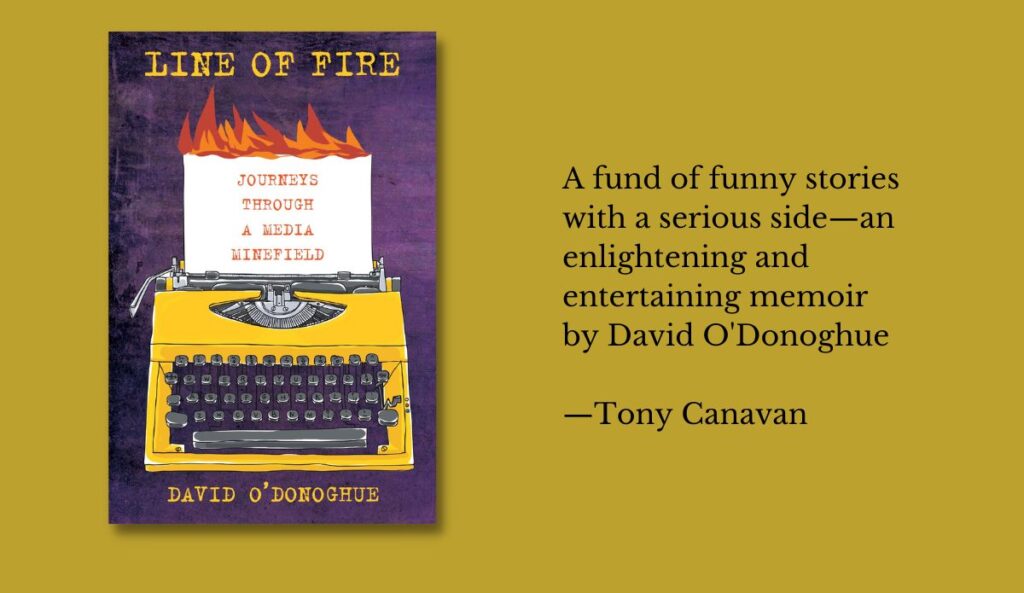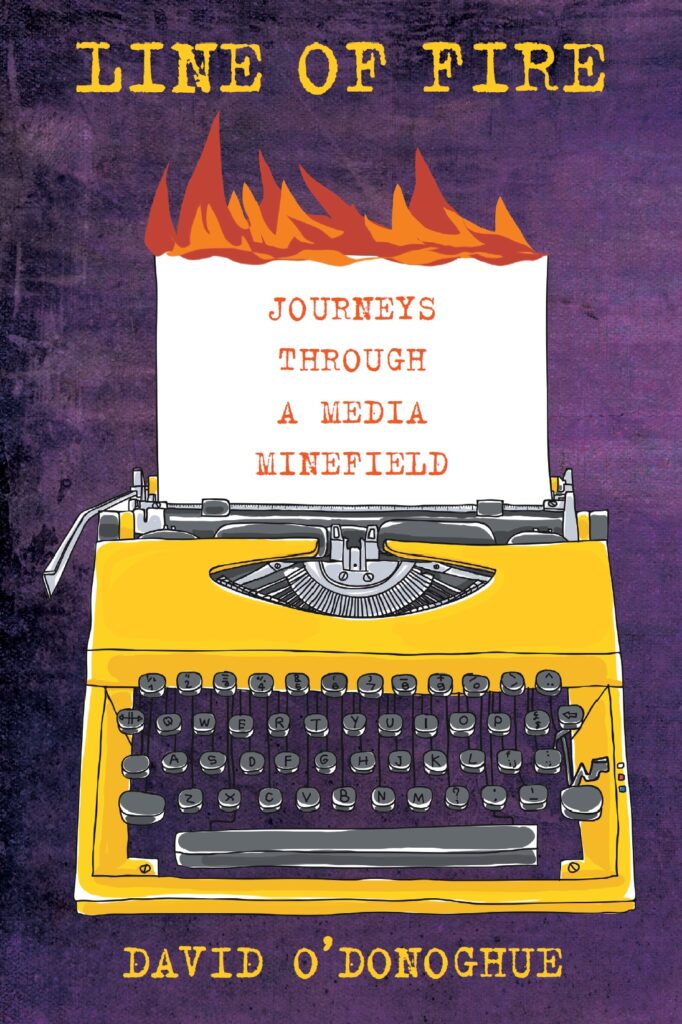
Line of Fire: Journeys through a Media Minefield|David O’Donoghue|Orpen Press| 978-1-78605-166-0|€17
An enlightening and entertaining memoir by David O’Donoghue
David O’Donoghue not only relates the stages of his varied career, but gives us an insider’s view of the RTÉ newsroom and the ill-fated Century Radio, the country’s first independent national radio station.
by Tony Canavan
I have to admit to knowing David O’Donoghue. Many years ago when I was working as a Parliamentary (i.e. official) Reporter in the Oireachtas, David was one of my colleagues.
I did not stick it out in Leinster House, unlike David, who remained there until his retirement a few years ago. We kept in touch over the years but I had no idea that this staid public servant had led such an interesting and adventurous life before joining the ranks of the Parliamentary Reporters.
Not until I read this book did I learn that his earlier career as a journalist took him from the Irish midlands to Singapore and Paris.
Entertaining
This is an entertaining and enlightening memoir as David O’Donoghue not only relates the stages of his varied career, but gives us an insider’s view of the RTÉ newsroom and the ill-fated Century Radio, the country’s first independent national radio station.
O’Donoghue, as one might expect, is a natural storyteller and this memoir is full of memorable anecdotes, often very amusing. As a prelude, as it were, he tells the reader something of his own background, and how, although born in Cork, he was raised in Dublin as his father was transferred there by his employer, the Munster & Leinster Bank.
The funny stories he relates about his father – such as the branch in Ballinrobe left deserted of staff on race day – set the tone for much of the memoir. Speaking of insider’s stories, we also get the insider’s view of the demise of the Munster & Leinster, absorbed by the Allied Irish Bank.
Journalism
O’Donoghue may have been expected to follow in his father’s footsteps but instead he followed a career in journalism, beginning with a spell with at the Midland Tribune.
These were the days before journalism schools and diplomas when journalists largely learned on the job.
As he cut his teeth as a reporter, he met some interesting characters in the newspaper office, in the courtroom, and on the streets. Having come of age as a journalist, as it were, he moved on to work as a reporter for RTÉ, covering some of the most important news stories of the day, North and South of the Border.
His subsequent career took him far away from Donnybrook. He spent time with Agence France-Presse in Paris covering an array of stories from the vicissitudes of French politics to Miss Nude Europe!, where he was first assigned.

A fund of funny stories
We are familiar with depictions of small town Ireland from books and films, but David lived it for real and after a few years wanted to move on. A job at RTÉ came up and he was lucky to get it.
The chapters on his experience in the national broadcaster’s newsroom are in some ways the most interesting part of the book as it takes in the Troubles in the North as well as events in the South.
He entered one of the byways of journalism in working for industry focused magazines, first in the forest products sector in Brussels and then in the oil industry for a magazine based in Singapore. A return to Europe saw him involved with an early attempt at a pan-European TV channel, followed by a stint teaching journalism in Cornwall, before finally returning to Ireland and work with the doomed Century Radio.
It is a minor miracle that O’Donoghue had a successful marriage through all these changes of job and locations with his children being born in Singapore, Cornwall and Dublin.
All this is told with aplomb and much amusement. O’Donoghue has a fund of funny stories involving everyone from Charlie Haughey and Derek Davis to Gore Vidal and the Ayatollah Khomeini.
He managed to find humour even the darkest situations. I particularly enjoyed the story of the RUC chief constable who, during a serious riot on Belfast’s Falls Road, was only concerned about keeping his uniform clean as he was going later to a garden party to be presented to the Queen. O’Donoghue has an eye for detail and the telling phrase that keeps the reader turning the page.
A serious side
However, it was not all fun and games. There is a serious side to O’Donoghue as well. In his time he covered sad stories, such a family wiped out in a house fire, and serious events, not just the Northern Troubles but the ups and downs of Irish politics in these turbulent years.
He also takes time to reflect on the situations he found himself in. While he enjoyed his time at RTÉ, he was clearly frustrated at the management of the news department, and what he saw as their over cautious approach to some serious stories, particularly those relating to the Northern Troubles.
Likewise at Century Radio, he was often critical of its setup and the decisions taken which affected the station’s viability.
Eye-opening
From a personal point of view, I found this to be an eye-opening memoir, but anyone with an interest in journalism in Ireland and beyond will like it.
For the general reader, the amusing anecdotes and serious reflections will make this a book worth reading. It stops at just the right time when O’Donoghue’s career in journalism ceased, but I’m sure he could write an equally enthralling account of his years in Leinster House.

Tony Canavan is Consultant Editor at Books Ireland.











